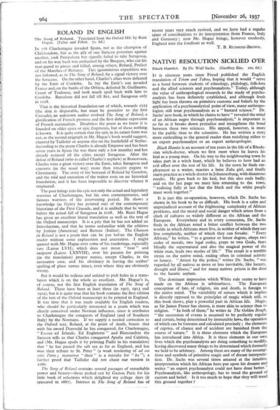ROLAND IN ENGLISH The Song, of Roland. Translated froth the
Oxford MS.-by Rene Hague. (Faber and Faber. 7s. 6d.).
IN 778 Charlemagne invaded Spain, not as the champion of Christendom, but as the ally of one Saracen potentate against another, took Pampeluna but signally failed to take Saragossa, and on his way back was ambushed by the Basques, who cut his rear-guard to pieces and killed, among others, Roland, Prefect of the Marches of Brittany. This ignominious expedition was not followed, as in The Song of Roland, by a signal victory over the Saracens. On the other hand, Charles's allies were defeated by the Emir of Cordoba. In 791 the Emir's son invaded France and, on the banks of the Orbieu, defeated St. Guillaume, Count of Toulouse, and took much spoil back with him to Cordoba. Barcelona did not fall till 8o t, and Saragossa only in 1118.
That is the historical foundation out of which, towards 1125 (the date is disputable, but must be posterior to the first Crusade), an unknown author evolved The Song of Roland, a glorification of French prowess and the first definite expression of French nationalism. Doubtless the poem as we know it is founded on older epics or epic fragments, but of these nothing is known. It is quite certain that the epic in its extant form was not, as the second epigraph in Mr. Hague's book would suggest, chanted by Taillefer or anyone else on the battlefield of Senlac. According to the poem Charles is already Emperor and has been seven years in Spain (he was there only a few months) and has already reduced all the cities except Saragossa. After the defeat of Roland (who is called Charles's nephew) at Roncevaux, Charles wins a great victory over the Emir, takes Saragossa and converts (in the usual way) more than 1oo,000 pagans to Christianity. The story of the betrayal of Roland by Ganelon, and the trial and execution of the traitor rests on no historical foundation, and it has been impossible to discover whence it originated.
The poet brings into his epic not only the actual and legendary warriors of Charlemagne, but his own contemporaries, and famous warriors of the intervening period. He shows a knowledge (as GyOry has pointed out) of the contemporary historians of the First Crusade, and it is unlikely that he wrote before the actual fall of Saragossa in 1118. Mr. Rene Hague has given an excellent literal translation as well as the text of the Oxford* manuscript. It is a pity that he has not added an Introduction, and that he seems unfamiliar with the editions by Jenkins (American) and Bertoni (Italian). The Chanson de Roland is not a poem that can be put before the English reader without some explanation and annotation. I might quarrel with Mr. Hague over some of his renderings, especially vers (Laisse LVII), which does not mean " bear " and meignent (Laisse LXXVIII), over his passion for printing (in the translation) proper names, except Charles, in the accusative case, and his obstinacy in leaving the scribes' spelling of place names intact, even where they are obviously wrong.
But it would be tedious and unkind to pick holes in a trans- lation which is on the whole so excellent. Mr. Hague's is, of course, not the first English translation of The Song of Roland. There have been at least three (in 1907, 1913 and 1919), but it is quite true that his book contains the first edition of the text of the Oxford manuscript to be printed in England. It was time that it was made available for English readers, who should be particularly interested in a poem which was clearly conceived under Norman influence, since it attributes to Charlemagne the conquests of England (and of Southern Italy) by the Normans. If we supply a needed correction to the Oxford text, Roland, at the point of death, boasts that with his sword Durendal he has conquered, for Charlemagne, " Escoce ed Irlande, Ed Engleterre " and Blancandrin the Saracen tells us that Charles conquered Apulia and Calabria, and (Mr. Hague spoils it by printing Puille in his translation) that " he has passed the salt sea as far as England, and has won their tribute to St. Peter " (a weak rendering of ad oes seint Perre ; moreover " their " is a mistake for " its "), a further proof that Taillefer did not chant our version in 1066.
The Song of Roland contains several passages of remarkable power and beauty—those picked out by Gaston Paris for his little book of selections which delighted my college days (it appeared in 1887). Interest in The Song of Roland has of recent years very much revived, and we __have had a regular spate of contributions to its interpretation from France, Italy and Germany ; now Mr. Hague brings, however modestly, England into the forefront as well.
T. B. RUDMOSE-BROWN.














































 Previous page
Previous page